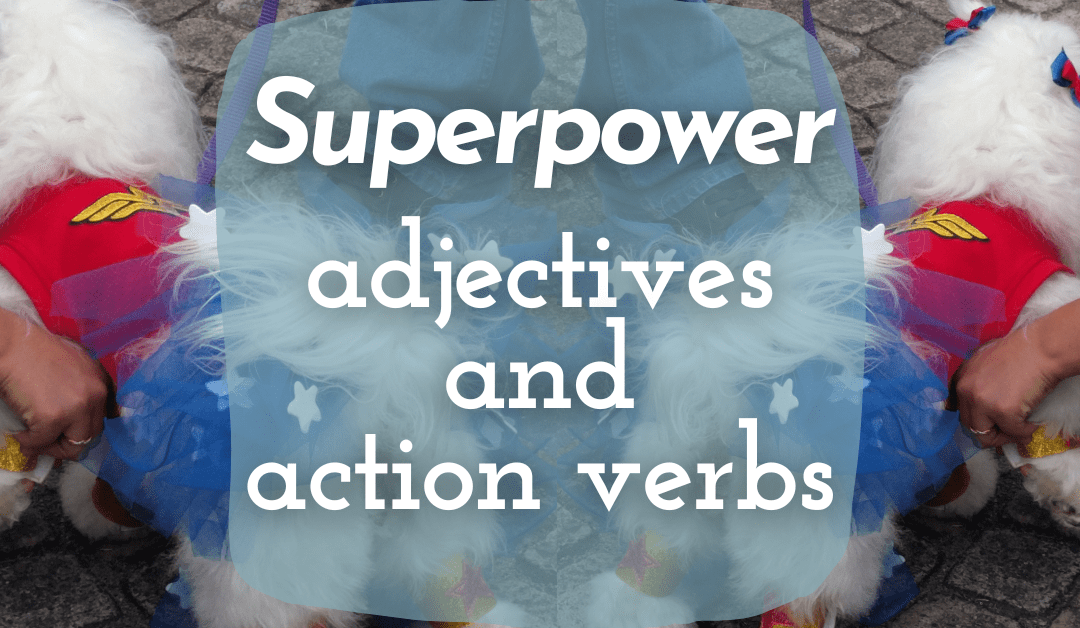In my post “What are your superpowers?“, I talked about the importance of preparing a portfolio of stories that center on you as the superhero of the interview. While clearly organizing your work experience stories is key to interview preparation, the words you choose are also crucial to describing your strengths, skills, and accomplishments.
Here are some resources to help you find the adjectives to describe your superpowers and the verbs to explain your experience.
Superpower Adjectives
Start preparing for an interview by uncovering your ‘superpowers’ — the qualities and characteristics that define you. These will become the theme for your work experience stories and the structure on which you build your answer to that all-important opening: “tell me about yourself.”
You could begin brainstorming your superpower adjectives by thinking about how your mom, your best friend, your spouse, a respected colleague, or your favorite boss might answer if they were asked to choose three adjectives to describe you. Not all of their imagined answers would be appropriate for an interview, but this approach might make it easier for you to think about your best qualities.
You might also refer to the many lists available online, but here are some of my favorite superpower adjectives.
- Ambitious
- Attentive
- Confident
- Conscientious
- Cooperative
- Detail-Oriented
- Diligent
- Easy-going
- Efficient
- Effective
- Enthusiastic
- Focused
- Flexible
- Hard-working
- Honest
- Innovative
- Insightful
- Loyal
- Methodical
- Motivated
- Organized
- Patient
- Personable
- Proactive
- Problem-solver
- Punctual
- Reliable
- Responsible
- Resourceful
- Team player
How would you describe yourself? is also a nice list that organizes adjectives you could use to describe your work style, personality, and how you work with others.
With all of these adjectives, be sure you understand the connotation of the word — the feeling a word can create. For example, in the list I linked to above, they include the word “calculated,” but I would advise against using this word. It’s too close to the word “calculating” and could leave the interviewer with the feeling that you’re sneaky and not to be trusted.
If you’re not comfortable with a word because you’re not quite sure what it means, don’t use it just because it sounds impressive. If you think it’s a good word to describe you, but it’s a new word for you, then check with a few people to make sure you’re using it appropriately.
Action Verbs
I love this list of updated action verbs from The Interview Guys (click the link to read the full article).
Rather than using the same overused lists of verbs, they offer ideas of how to choose stronger verbs to help you stand out.
- Scenario: You’re a manager. Tired verbs: led, motivated, managed, enforced, organized
- Action verbs: orchestrated, chaired, programmed, operated, spear-headed, collaborated, commissioned, advised, headed, delegated, established
- Scenario: You work directly with clients. Tired verbs: talked, supported, dealt
- Action verbs: advocated, fielded, consulted, arbitrated, mediated, informed, resolved, interfaced, updated, unified, motivated, explained, guided, facilitated, clarified, enabled
- Scenario: You’re a corporate time/money saver. Tired verbs: saved, improved
- Action verbs: capitalized, enhanced, expedited, stimulated, maximized, solved, strengthened, settled, reconciled, eased, elevated, negotiated, standardized, influenced, arbitrated, boosted
- Scenario: You’re an innovator. Tired verbs: improved, streamlined, organized
- Action verbs: clarified, integrated, modified, overhauled, redesigned, restructured, transformed, adapted, debugged, regulated, restored, fabricated, remodeled
- Scenario: You’re a communicator. Tired verbs: wrote, spoke, relayed
- Action verbs: composed, corresponded, illustrated, persuaded, lobbied, defined, formulated, synthesized, conveyed, disbursed, publicized, discussed, informed
Likewise, this list from the University of Michigan asks questions to help you find the best verb to describe your experience. Here are just two examples.
- Example: Did you improve things?
- You could use the words: Advanced Augmented Corrected Cultivated Developed Enhanced Enlarged Enriched Expedited Extended Improved Implemented Increased Modernized Reduced Resolved Revitalized Solved Surpassed Streamlined Treated Updated Upgraded
- Example: Did you organize something?
- You could use the words: Arranged Assembled Categorized Collected Compiled Combined Connected Consolidated Coordinated Correlated Implemented Organized Prepared Structured Summarized Systematized
Finally, this list from the University of Wisconsin organizes action verbs by skill type.
For example, they list verbs that can be used to talk about Communication & Team Building Skills, Creativity & Problem Solving Skills, Leadership, Management, & Supervision Skills, Teaching, Social Service, & Training Skills, Organization & Administrative Skills, and Research & Information Processing.
Of course, a lot of verbs are repeated, but sometimes it’s helpful to see how these lists organize your options in different ways.
One additional note of caution: don’t use verbs that are too far out of your comfort zone. If you’re not completely sure what a word means, or you feel like you don’t fully understand its nuance, then don’t use it.
While it’s great to add words to your repertoire, it’s more important that you feel confident when describing the superhero that you are!

